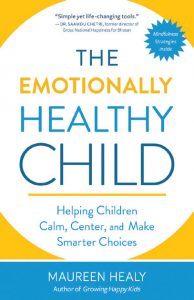Our children feel things deeply, including surprise, delight, disgust, anger, frustration, revenge, jealousy, and enthusiasm. They often don’t even have the words to communicate their feelings, which is why they sometimes act them out inappropriately, but once they learn what emotions are and how they work, and apply a method to release them constructively, they can experience emotional ahas, which lead them in a positive direction.
I want to share how I conceptualize emotions, especially as I see emotional health. There are two types of emotions:
1. helpful
2. challenging
When I work with children, we focus on cultivating the helpful emotions and an emotionally healthy mindset so that children can see the world accurately and respond with intelligence. They learn to use their right and left brain in unison as much as possible at their stage of emotional development. We also work on identifying challenging emotions — let’s not say negative or bad, but those emotions that throw them off-balance, which they need to release constructively.
Often we begin by helping our children with their challenging emotions, because those are the ones that literally scream the loudest. Boys and girls yell, cry, and stomp their feet in anger, sadness, and frustration. But it’s the helpful emotions such as patience, calmness, and enthusiasm that need to be equally cultivated to balance the scales and enlarge a child’s capacity to handle the challenging emotions.
Ultimately, your child doesn’t need to be all smiles but must be able to face any emotion that arises and learn how to skillfully express it. This is the emotionally healthy child. He is learning to embrace his whole bucket of emotions and then empty it when he needs to. He also learns how to fill his bucket with positive relationships, interests, and activities, which give his life meaning and purpose.
The Secret to Success: Discomfort
One of the biggest challenges to children becoming emotionally healthy is the fact that they often cannot tolerate discomfort. They feel an uncomfortable emotion like anger and immediately want it to be gone, so they scream, punch, or throw a tantrum to release it. This provides relief but isn’t constructive. One of our roles in raising emotionally healthy children and helping them transform lemons into lemonade includes helping them:
• Embrace discomfort
• Increase their “discomfort tolerance” level
• Realize that uncomfortable emotions come and go
Children can learn to raise their discomfort tolerance by feeling uncomfortable in a safe environment. Fatima, age seven, wants to win at every board game she plays. She’s a perfectionist by anyone’s standards, which is why I introduced a game that was a little tough for her and which I thought she’d likely lose (a very uncomfortable emotion). And yes, she did lose at the board game, Clue, which incited some distressing emotions, but I helped her work through them and realize that she was bigger than any challenging emotion.
When I was younger I recall my parents introducing me to novel experiences to widen my comfort zone, such as going to the Macy’s Thanksgiving Day Parade in New York City, with millions of people, and visiting cousins in Ireland who didn’t yet have indoor plumbing, so the bathroom was outside (what?). I learned early on that sometimes the really good things are at the other end of discomfort, and you need to go through the discomfort, not around it, to have unforgettable and happier experiences.
I’m not necessarily suggesting that you take your children to farms without plumbing, but I am suggesting that you help expand your children’s ability to tolerate discomfort in safe and positive ways. This will also help them realize they are bigger than any of their big feelings. Children have the capacity to endure a little discomfort, express it constructively, and move beyond it to something more positive.
TAKE NOTE: Children’s Brains Are Still “Cooking”
Your child’s brain isn’t fully formed until his mid-twenties, and the last thing to come online is judgment (in their prefrontal cortex). This is one of the best reasons to muster more compassion for your child, since he’s not “fully cooked” yet. Children are learning not only how to bring logic (left brain) online sooner but also how to move from quick reactions (lower brain) to more deliberate responses (upper brain). Knowing that some of your child’s challenges in becoming less reactive are biologically rooted, can help you find the patience to help him yet again. This includes helping him form new neuronal pathways, where he tolerates more discomfort and moves through it with inner confidence.
Wholeness, Not Happiness
One of my passions in life is helping children become happier, whether they’ve lost a soccer game or something far more serious. The path to positive emotional health and happier experiences isn’t around these challenges but through them. Whether the challenge is a bully on the bus or a bruised knee, every child has moments of sadness, anxiety, disappointment, and rejection when they just don’t know what to do. Our job is to be their cheerleaders, to help them rise up and move forward with skill on the path toward becoming emotionally healthy and happier. But make no mistake — my goal isn’t simply to help you raise your children’s happiness but something even more valuable: their wholeness, the ability to embrace whatever emotion is occurring, whether it’s easy like joy or more challenging like grief. The whole child is learning to be honest, authentic, and genuine about her emotions.
Wholeness is important because it’s based on the idea that all our emotions, helpful and challenging, are good and that it’s what we do with them that matters. If your daughter is angry, she doesn’t pretend everything is okay. She might say instead, “I feel rotten,” and that is perfectly healthy. Being honest about our emotions, and learning how to express them constructively, is the mark of real emotional health, not simply putting on a happy face.
We want to raise healthier, happier, and yes, whole children. Boys and girls who can face emotions, become tolerant of uncomfortable feelings (anger, nervousness), and recognize that they’re capable of handling whatever shows up. One of my clients, Simone, at age ten is learning how to face her challenging emotions. She’s the main character in her upcoming school play, The Sound of Music, and has the jitters. Simone is learning relaxation techniques but also that being nervous is normal, especially if you’ve never done something before.
Being whole is valuable because it allows you to honor each moment, face whatever arises, and seek to be an authentic person who experiences all of life’s different emotions without prejudice. Helping children learn not to run from their challenging feelings but to handle them with skill is necessary for every emotionally healthy child.
Bump in the Road: Screens
Last year I was asked to provide commentary after a group of parents watched the documentary Screenagers together. Sitting in the audience, I could hear audible gasps when doctors discussed how a scan of a child’s video game–obsessed brain was similar to that of an adult drug addict. Both were seeking those immediate feel-good chemicals, dopamine and serotonin, which they felt when they got immediate satisfaction from the video game or the drug.
Certain personalities are more prone to addictive behavior, which is rooted in their genetic heritage and biological composition. Said differently, some children aren’t even interested in playing video games, while another child cannot turn the game off without a screaming match. For the latter scenario, what is the solution? That’s the million-dollar question, without one definitive answer, but research has shown that these approaches help:
• Create a media agreement (noting how much screen time is agreed on daily)
• Set rules
• Model healthy disengagement (from devices)
• Praise progress
Ultimately, you need to recognize and work with the child you have. My office has a waiting room filled with a variety of activities to entertain children. Some children want to play with blocks (regardless of age) or read one of my Animal Planet books, while other children cannot wait to get their hands on their parent’s iPhone or iPad. Understanding the type of child you have and tailoring an approach to help him develop a healthy relationship with screens, mobile devices, and tablets is essential to his emotional health.
One real challenge is the fact that children are digitally smarter than we are. Emily, a twelve-year-old client, is an Instagram star and has more than 10 million views of the last song she posted. I asked to see it. She quickly replied, “My mom turned off my apps,” and then a second later realized, “Wait, I can turn it back on without her knowing.”
What I know for sure is that helping our children develop a healthy relationship with screens doesn’t actually have to do with screens themselves — it has to do with cultivating honesty, self-control, and attentional abilities. These are the game-changing skills that when grown can be applied across the board — whether that’s helping your daughter (like Marisa) turn off the television without a major meltdown or helping your son tell you how he’s really feeling.
Excerpted from the book The Emotionally Healthy Child. ©2018 by Maureen Healy. Printed with permission from New World Library — newworldlibrary.com.

 Maureen Healy is the author of The Emotionally Healthy Child and Growing Happy Kids, which won the Nautilus and Readers’ Favorite book awards in 2014. A popular Psychology Today blogger and sought-after public speaker, Maureen runs a global mentoring program for elementary-aged children and works with parents and their children in her busy private practice. Her expertise in social and emotional learning has taken her all over the world, including working with Tibetan refugee children at the base of the Himalayas to classrooms in Northern California. Visit her online at growinghappykids.com.
Maureen Healy is the author of The Emotionally Healthy Child and Growing Happy Kids, which won the Nautilus and Readers’ Favorite book awards in 2014. A popular Psychology Today blogger and sought-after public speaker, Maureen runs a global mentoring program for elementary-aged children and works with parents and their children in her busy private practice. Her expertise in social and emotional learning has taken her all over the world, including working with Tibetan refugee children at the base of the Himalayas to classrooms in Northern California. Visit her online at growinghappykids.com.




















